Power, Politics, and Conflict: A Leadership Practice Analysis Report
VerifiedAdded on 2023/06/05
|8
|2241
|85
Report
AI Summary
This report delves into leadership practices, exploring the concepts of power, organizational politics, and conflict within a business context, particularly referencing Unilever. It examines different types of power, including reward, legitimate, coercive, expert, and referent power, and their impact on organizational dynamics. The report further analyzes organizational politics, discussing the high ground, the woods, the weed, and the rock, and their roles in shaping workplace interactions. It also addresses the nature of conflict, its causes such as cultural differences and clashes of interest, and its potential impact on organizational outcomes. The report concludes by emphasizing the importance of effective leadership in fostering positive relationships and productive work environments, advocating for a balance between formal and informal working procedures.
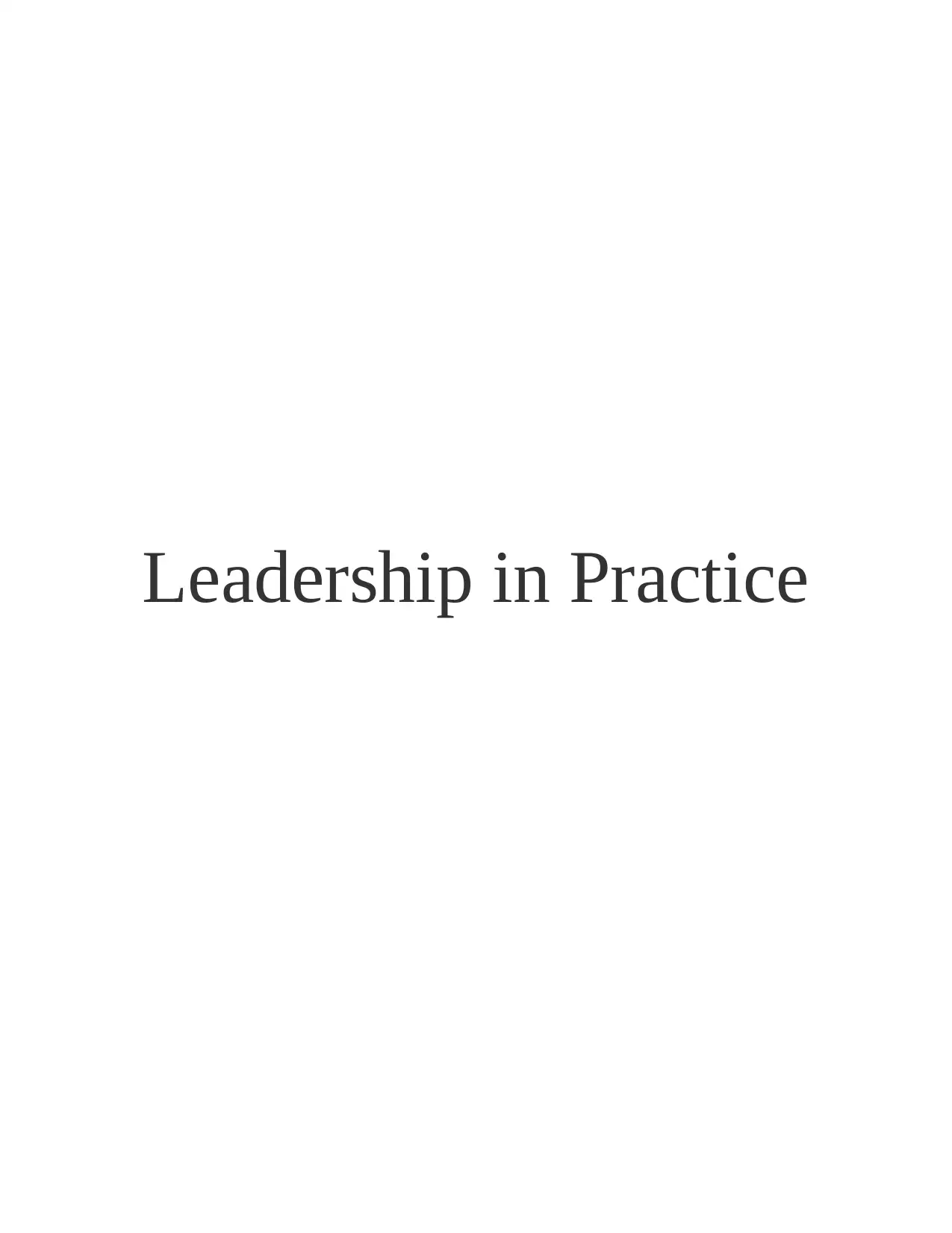
Leadership in Practice
Paraphrase This Document
Need a fresh take? Get an instant paraphrase of this document with our AI Paraphraser
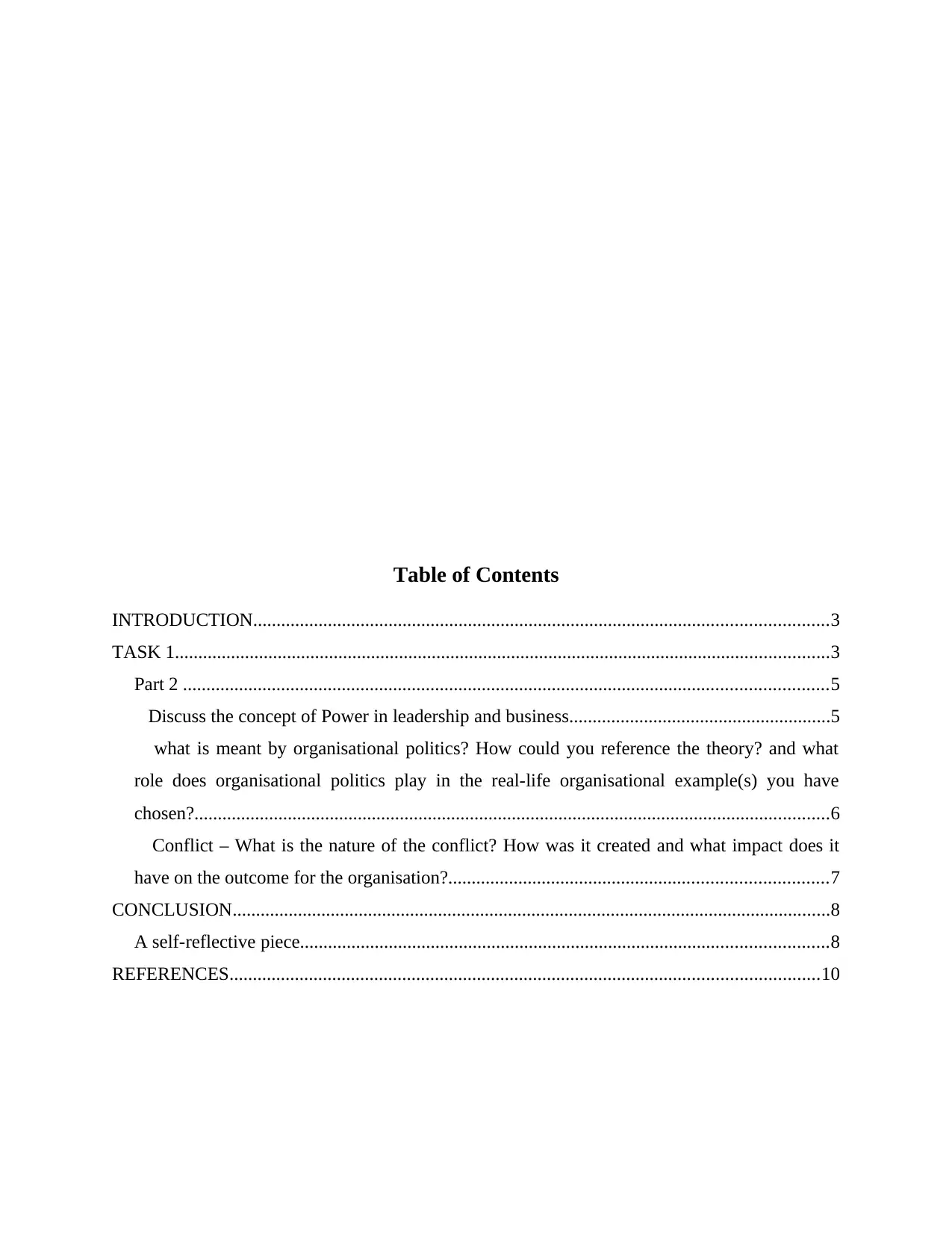
Table of Contents
INTRODUCTION...........................................................................................................................3
TASK 1............................................................................................................................................3
Part 2 ..........................................................................................................................................5
Discuss the concept of Power in leadership and business........................................................5
what is meant by organisational politics? How could you reference the theory? and what
role does organisational politics play in the real-life organisational example(s) you have
chosen?........................................................................................................................................6
Conflict – What is the nature of the conflict? How was it created and what impact does it
have on the outcome for the organisation?.................................................................................7
CONCLUSION................................................................................................................................8
A self-reflective piece.................................................................................................................8
REFERENCES..............................................................................................................................10
INTRODUCTION...........................................................................................................................3
TASK 1............................................................................................................................................3
Part 2 ..........................................................................................................................................5
Discuss the concept of Power in leadership and business........................................................5
what is meant by organisational politics? How could you reference the theory? and what
role does organisational politics play in the real-life organisational example(s) you have
chosen?........................................................................................................................................6
Conflict – What is the nature of the conflict? How was it created and what impact does it
have on the outcome for the organisation?.................................................................................7
CONCLUSION................................................................................................................................8
A self-reflective piece.................................................................................................................8
REFERENCES..............................................................................................................................10
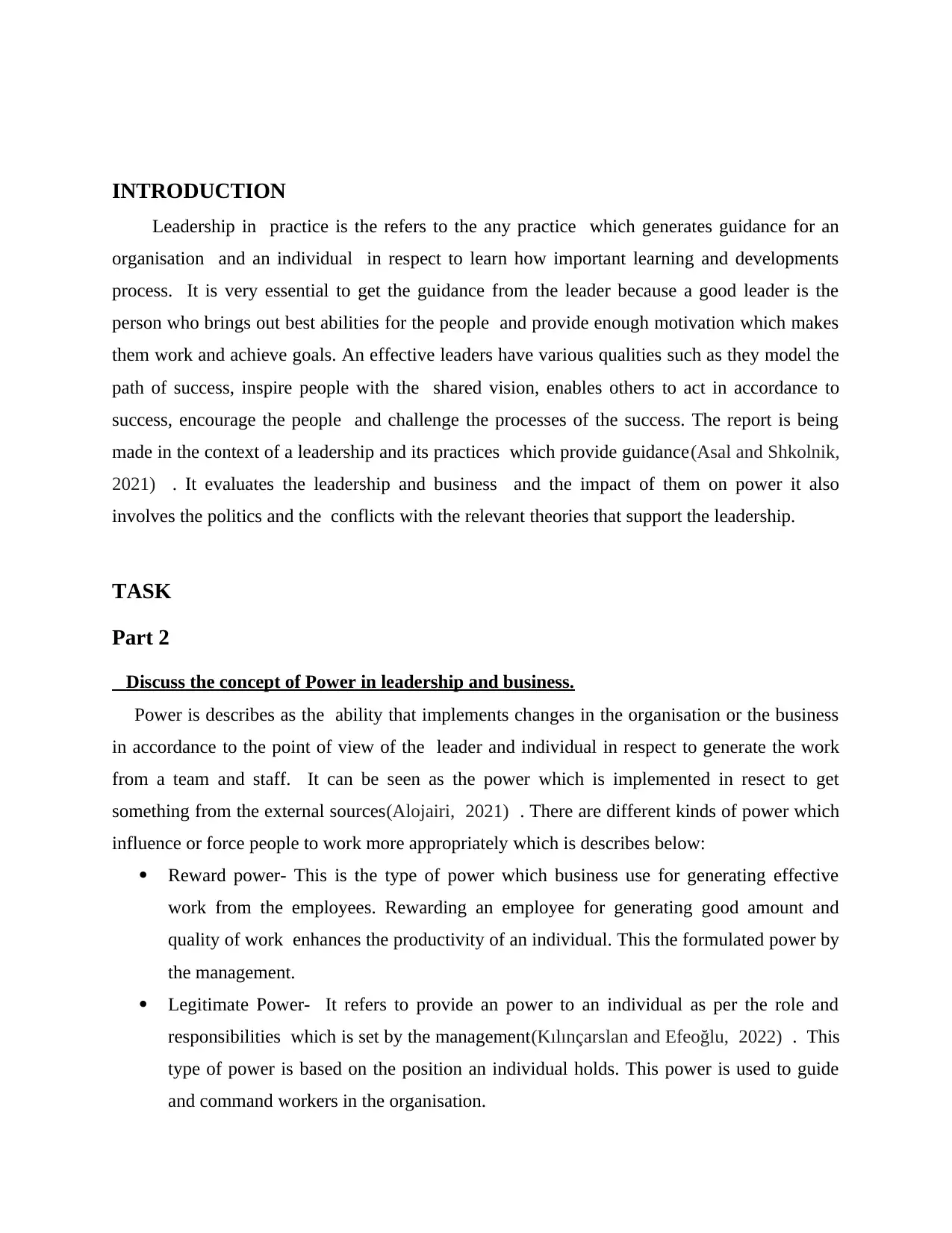
INTRODUCTION
Leadership in practice is the refers to the any practice which generates guidance for an
organisation and an individual in respect to learn how important learning and developments
process. It is very essential to get the guidance from the leader because a good leader is the
person who brings out best abilities for the people and provide enough motivation which makes
them work and achieve goals. An effective leaders have various qualities such as they model the
path of success, inspire people with the shared vision, enables others to act in accordance to
success, encourage the people and challenge the processes of the success. The report is being
made in the context of a leadership and its practices which provide guidance(Asal and Shkolnik,
2021) . It evaluates the leadership and business and the impact of them on power it also
involves the politics and the conflicts with the relevant theories that support the leadership.
TASK
Part 2
Discuss the concept of Power in leadership and business.
Power is describes as the ability that implements changes in the organisation or the business
in accordance to the point of view of the leader and individual in respect to generate the work
from a team and staff. It can be seen as the power which is implemented in resect to get
something from the external sources(Alojairi, 2021) . There are different kinds of power which
influence or force people to work more appropriately which is describes below:
Reward power- This is the type of power which business use for generating effective
work from the employees. Rewarding an employee for generating good amount and
quality of work enhances the productivity of an individual. This the formulated power by
the management.
Legitimate Power- It refers to provide an power to an individual as per the role and
responsibilities which is set by the management(Kılınçarslan and Efeoğlu, 2022) . This
type of power is based on the position an individual holds. This power is used to guide
and command workers in the organisation.
Leadership in practice is the refers to the any practice which generates guidance for an
organisation and an individual in respect to learn how important learning and developments
process. It is very essential to get the guidance from the leader because a good leader is the
person who brings out best abilities for the people and provide enough motivation which makes
them work and achieve goals. An effective leaders have various qualities such as they model the
path of success, inspire people with the shared vision, enables others to act in accordance to
success, encourage the people and challenge the processes of the success. The report is being
made in the context of a leadership and its practices which provide guidance(Asal and Shkolnik,
2021) . It evaluates the leadership and business and the impact of them on power it also
involves the politics and the conflicts with the relevant theories that support the leadership.
TASK
Part 2
Discuss the concept of Power in leadership and business.
Power is describes as the ability that implements changes in the organisation or the business
in accordance to the point of view of the leader and individual in respect to generate the work
from a team and staff. It can be seen as the power which is implemented in resect to get
something from the external sources(Alojairi, 2021) . There are different kinds of power which
influence or force people to work more appropriately which is describes below:
Reward power- This is the type of power which business use for generating effective
work from the employees. Rewarding an employee for generating good amount and
quality of work enhances the productivity of an individual. This the formulated power by
the management.
Legitimate Power- It refers to provide an power to an individual as per the role and
responsibilities which is set by the management(Kılınçarslan and Efeoğlu, 2022) . This
type of power is based on the position an individual holds. This power is used to guide
and command workers in the organisation.
⊘ This is a preview!⊘
Do you want full access?
Subscribe today to unlock all pages.

Trusted by 1+ million students worldwide
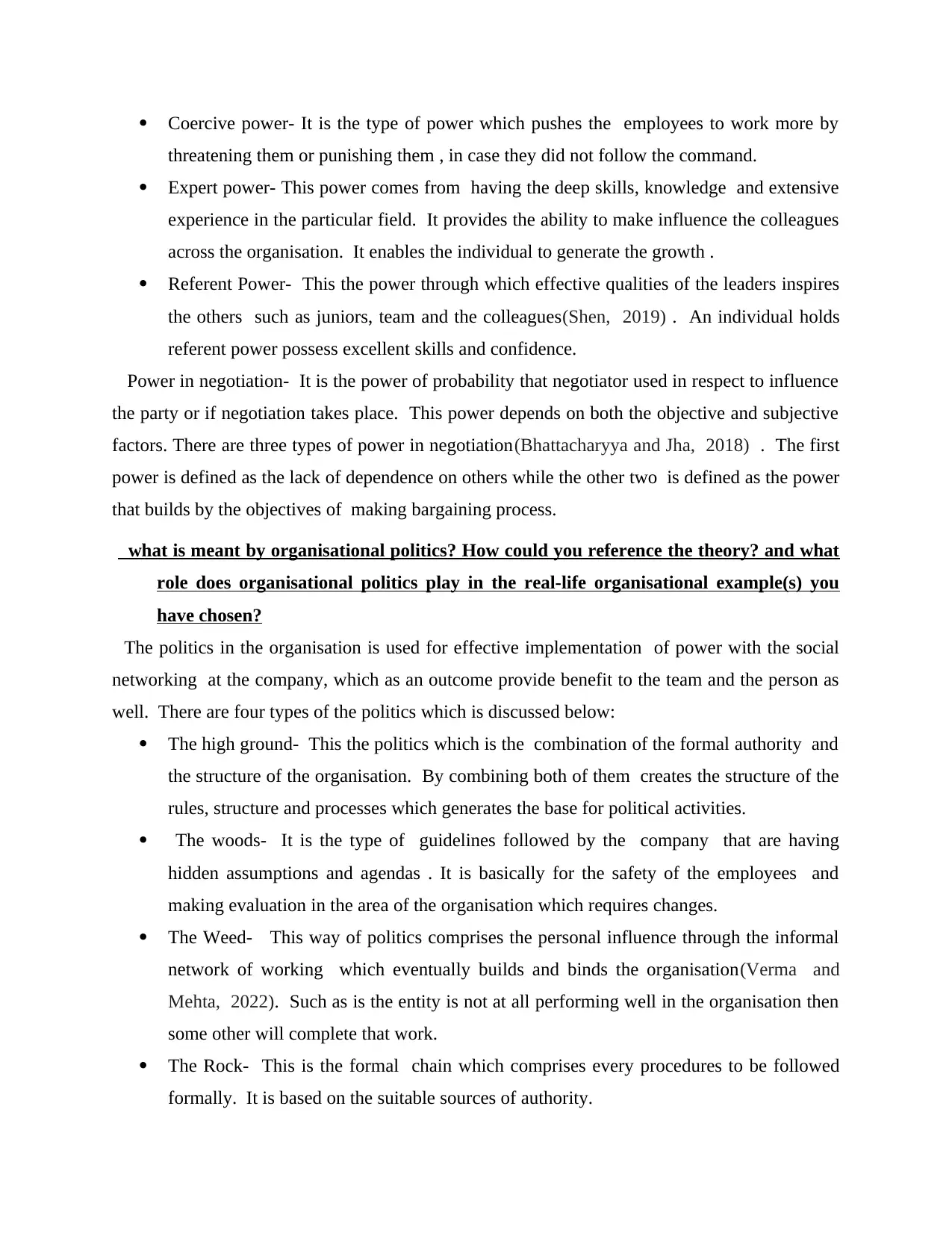
Coercive power- It is the type of power which pushes the employees to work more by
threatening them or punishing them , in case they did not follow the command.
Expert power- This power comes from having the deep skills, knowledge and extensive
experience in the particular field. It provides the ability to make influence the colleagues
across the organisation. It enables the individual to generate the growth .
Referent Power- This the power through which effective qualities of the leaders inspires
the others such as juniors, team and the colleagues(Shen, 2019) . An individual holds
referent power possess excellent skills and confidence.
Power in negotiation- It is the power of probability that negotiator used in respect to influence
the party or if negotiation takes place. This power depends on both the objective and subjective
factors. There are three types of power in negotiation(Bhattacharyya and Jha, 2018) . The first
power is defined as the lack of dependence on others while the other two is defined as the power
that builds by the objectives of making bargaining process.
what is meant by organisational politics? How could you reference the theory? and what
role does organisational politics play in the real-life organisational example(s) you
have chosen?
The politics in the organisation is used for effective implementation of power with the social
networking at the company, which as an outcome provide benefit to the team and the person as
well. There are four types of the politics which is discussed below:
The high ground- This the politics which is the combination of the formal authority and
the structure of the organisation. By combining both of them creates the structure of the
rules, structure and processes which generates the base for political activities.
The woods- It is the type of guidelines followed by the company that are having
hidden assumptions and agendas . It is basically for the safety of the employees and
making evaluation in the area of the organisation which requires changes.
The Weed- This way of politics comprises the personal influence through the informal
network of working which eventually builds and binds the organisation(Verma and
Mehta, 2022). Such as is the entity is not at all performing well in the organisation then
some other will complete that work.
The Rock- This is the formal chain which comprises every procedures to be followed
formally. It is based on the suitable sources of authority.
threatening them or punishing them , in case they did not follow the command.
Expert power- This power comes from having the deep skills, knowledge and extensive
experience in the particular field. It provides the ability to make influence the colleagues
across the organisation. It enables the individual to generate the growth .
Referent Power- This the power through which effective qualities of the leaders inspires
the others such as juniors, team and the colleagues(Shen, 2019) . An individual holds
referent power possess excellent skills and confidence.
Power in negotiation- It is the power of probability that negotiator used in respect to influence
the party or if negotiation takes place. This power depends on both the objective and subjective
factors. There are three types of power in negotiation(Bhattacharyya and Jha, 2018) . The first
power is defined as the lack of dependence on others while the other two is defined as the power
that builds by the objectives of making bargaining process.
what is meant by organisational politics? How could you reference the theory? and what
role does organisational politics play in the real-life organisational example(s) you
have chosen?
The politics in the organisation is used for effective implementation of power with the social
networking at the company, which as an outcome provide benefit to the team and the person as
well. There are four types of the politics which is discussed below:
The high ground- This the politics which is the combination of the formal authority and
the structure of the organisation. By combining both of them creates the structure of the
rules, structure and processes which generates the base for political activities.
The woods- It is the type of guidelines followed by the company that are having
hidden assumptions and agendas . It is basically for the safety of the employees and
making evaluation in the area of the organisation which requires changes.
The Weed- This way of politics comprises the personal influence through the informal
network of working which eventually builds and binds the organisation(Verma and
Mehta, 2022). Such as is the entity is not at all performing well in the organisation then
some other will complete that work.
The Rock- This is the formal chain which comprises every procedures to be followed
formally. It is based on the suitable sources of authority.
Paraphrase This Document
Need a fresh take? Get an instant paraphrase of this document with our AI Paraphraser
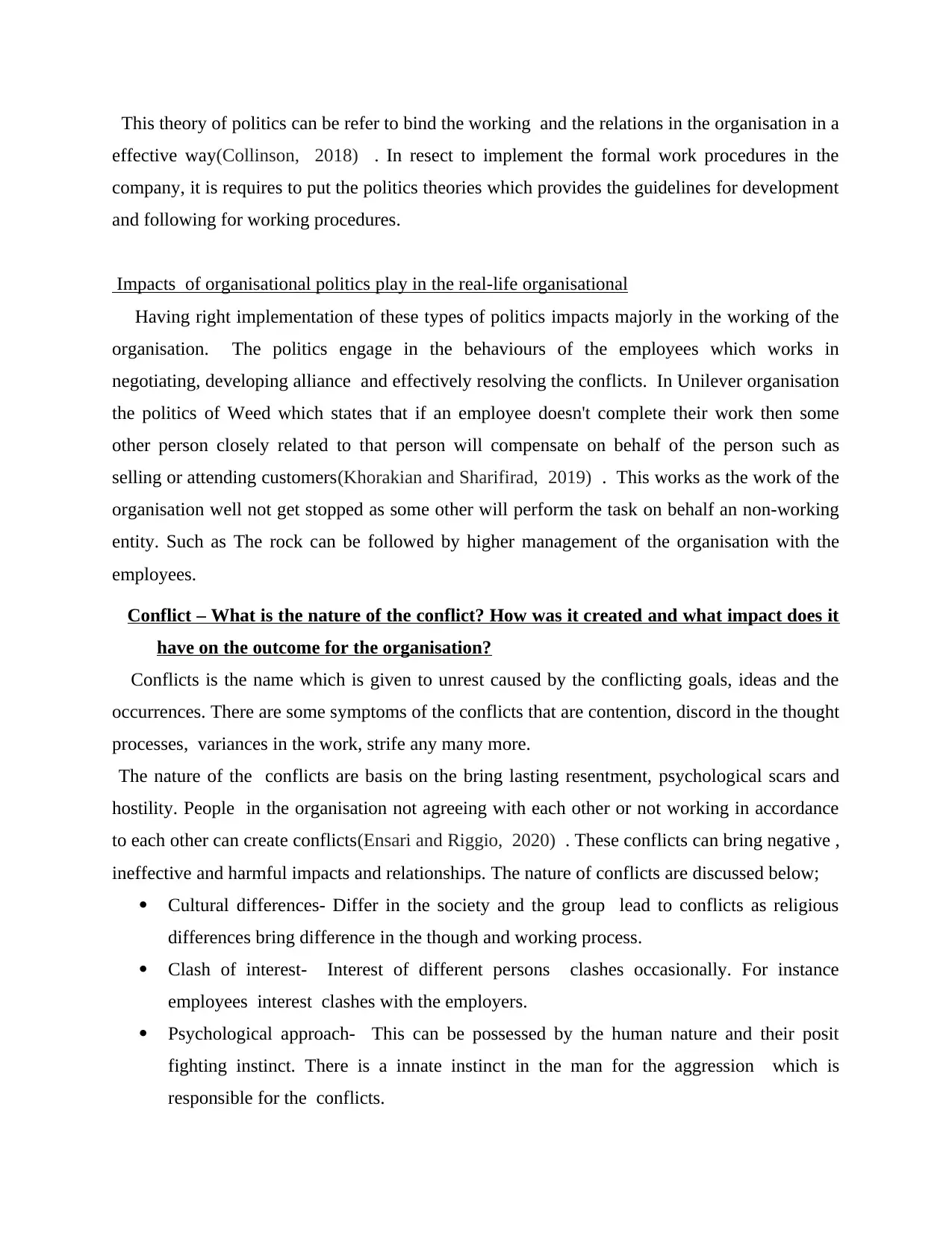
This theory of politics can be refer to bind the working and the relations in the organisation in a
effective way(Collinson, 2018) . In resect to implement the formal work procedures in the
company, it is requires to put the politics theories which provides the guidelines for development
and following for working procedures.
Impacts of organisational politics play in the real-life organisational
Having right implementation of these types of politics impacts majorly in the working of the
organisation. The politics engage in the behaviours of the employees which works in
negotiating, developing alliance and effectively resolving the conflicts. In Unilever organisation
the politics of Weed which states that if an employee doesn't complete their work then some
other person closely related to that person will compensate on behalf of the person such as
selling or attending customers(Khorakian and Sharifirad, 2019) . This works as the work of the
organisation well not get stopped as some other will perform the task on behalf an non-working
entity. Such as The rock can be followed by higher management of the organisation with the
employees.
Conflict – What is the nature of the conflict? How was it created and what impact does it
have on the outcome for the organisation?
Conflicts is the name which is given to unrest caused by the conflicting goals, ideas and the
occurrences. There are some symptoms of the conflicts that are contention, discord in the thought
processes, variances in the work, strife any many more.
The nature of the conflicts are basis on the bring lasting resentment, psychological scars and
hostility. People in the organisation not agreeing with each other or not working in accordance
to each other can create conflicts(Ensari and Riggio, 2020) . These conflicts can bring negative ,
ineffective and harmful impacts and relationships. The nature of conflicts are discussed below;
Cultural differences- Differ in the society and the group lead to conflicts as religious
differences bring difference in the though and working process.
Clash of interest- Interest of different persons clashes occasionally. For instance
employees interest clashes with the employers.
Psychological approach- This can be possessed by the human nature and their posit
fighting instinct. There is a innate instinct in the man for the aggression which is
responsible for the conflicts.
effective way(Collinson, 2018) . In resect to implement the formal work procedures in the
company, it is requires to put the politics theories which provides the guidelines for development
and following for working procedures.
Impacts of organisational politics play in the real-life organisational
Having right implementation of these types of politics impacts majorly in the working of the
organisation. The politics engage in the behaviours of the employees which works in
negotiating, developing alliance and effectively resolving the conflicts. In Unilever organisation
the politics of Weed which states that if an employee doesn't complete their work then some
other person closely related to that person will compensate on behalf of the person such as
selling or attending customers(Khorakian and Sharifirad, 2019) . This works as the work of the
organisation well not get stopped as some other will perform the task on behalf an non-working
entity. Such as The rock can be followed by higher management of the organisation with the
employees.
Conflict – What is the nature of the conflict? How was it created and what impact does it
have on the outcome for the organisation?
Conflicts is the name which is given to unrest caused by the conflicting goals, ideas and the
occurrences. There are some symptoms of the conflicts that are contention, discord in the thought
processes, variances in the work, strife any many more.
The nature of the conflicts are basis on the bring lasting resentment, psychological scars and
hostility. People in the organisation not agreeing with each other or not working in accordance
to each other can create conflicts(Ensari and Riggio, 2020) . These conflicts can bring negative ,
ineffective and harmful impacts and relationships. The nature of conflicts are discussed below;
Cultural differences- Differ in the society and the group lead to conflicts as religious
differences bring difference in the though and working process.
Clash of interest- Interest of different persons clashes occasionally. For instance
employees interest clashes with the employers.
Psychological approach- This can be possessed by the human nature and their posit
fighting instinct. There is a innate instinct in the man for the aggression which is
responsible for the conflicts.
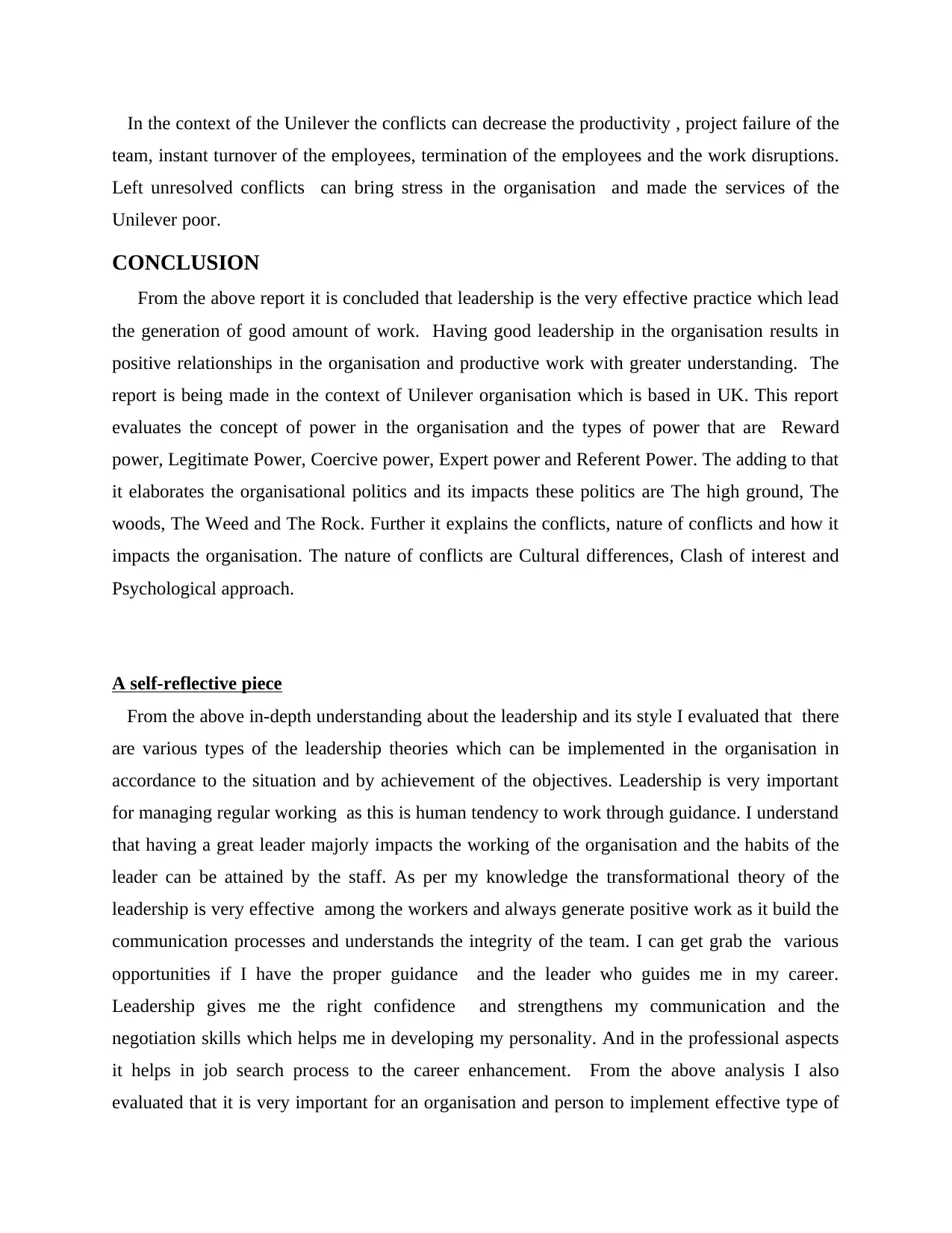
In the context of the Unilever the conflicts can decrease the productivity , project failure of the
team, instant turnover of the employees, termination of the employees and the work disruptions.
Left unresolved conflicts can bring stress in the organisation and made the services of the
Unilever poor.
CONCLUSION
From the above report it is concluded that leadership is the very effective practice which lead
the generation of good amount of work. Having good leadership in the organisation results in
positive relationships in the organisation and productive work with greater understanding. The
report is being made in the context of Unilever organisation which is based in UK. This report
evaluates the concept of power in the organisation and the types of power that are Reward
power, Legitimate Power, Coercive power, Expert power and Referent Power. The adding to that
it elaborates the organisational politics and its impacts these politics are The high ground, The
woods, The Weed and The Rock. Further it explains the conflicts, nature of conflicts and how it
impacts the organisation. The nature of conflicts are Cultural differences, Clash of interest and
Psychological approach.
A self-reflective piece
From the above in-depth understanding about the leadership and its style I evaluated that there
are various types of the leadership theories which can be implemented in the organisation in
accordance to the situation and by achievement of the objectives. Leadership is very important
for managing regular working as this is human tendency to work through guidance. I understand
that having a great leader majorly impacts the working of the organisation and the habits of the
leader can be attained by the staff. As per my knowledge the transformational theory of the
leadership is very effective among the workers and always generate positive work as it build the
communication processes and understands the integrity of the team. I can get grab the various
opportunities if I have the proper guidance and the leader who guides me in my career.
Leadership gives me the right confidence and strengthens my communication and the
negotiation skills which helps me in developing my personality. And in the professional aspects
it helps in job search process to the career enhancement. From the above analysis I also
evaluated that it is very important for an organisation and person to implement effective type of
team, instant turnover of the employees, termination of the employees and the work disruptions.
Left unresolved conflicts can bring stress in the organisation and made the services of the
Unilever poor.
CONCLUSION
From the above report it is concluded that leadership is the very effective practice which lead
the generation of good amount of work. Having good leadership in the organisation results in
positive relationships in the organisation and productive work with greater understanding. The
report is being made in the context of Unilever organisation which is based in UK. This report
evaluates the concept of power in the organisation and the types of power that are Reward
power, Legitimate Power, Coercive power, Expert power and Referent Power. The adding to that
it elaborates the organisational politics and its impacts these politics are The high ground, The
woods, The Weed and The Rock. Further it explains the conflicts, nature of conflicts and how it
impacts the organisation. The nature of conflicts are Cultural differences, Clash of interest and
Psychological approach.
A self-reflective piece
From the above in-depth understanding about the leadership and its style I evaluated that there
are various types of the leadership theories which can be implemented in the organisation in
accordance to the situation and by achievement of the objectives. Leadership is very important
for managing regular working as this is human tendency to work through guidance. I understand
that having a great leader majorly impacts the working of the organisation and the habits of the
leader can be attained by the staff. As per my knowledge the transformational theory of the
leadership is very effective among the workers and always generate positive work as it build the
communication processes and understands the integrity of the team. I can get grab the various
opportunities if I have the proper guidance and the leader who guides me in my career.
Leadership gives me the right confidence and strengthens my communication and the
negotiation skills which helps me in developing my personality. And in the professional aspects
it helps in job search process to the career enhancement. From the above analysis I also
evaluated that it is very important for an organisation and person to implement effective type of
⊘ This is a preview!⊘
Do you want full access?
Subscribe today to unlock all pages.

Trusted by 1+ million students worldwide
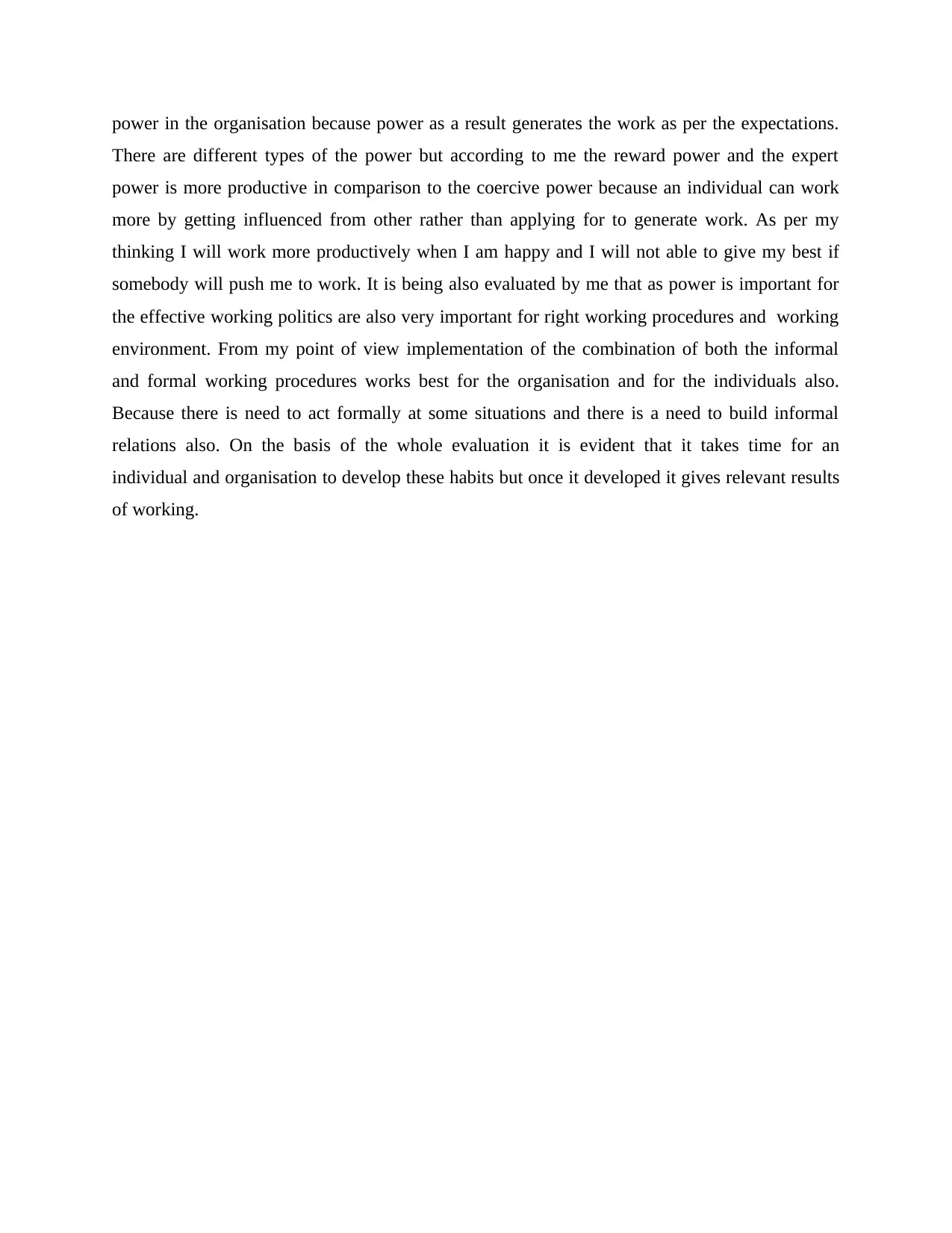
power in the organisation because power as a result generates the work as per the expectations.
There are different types of the power but according to me the reward power and the expert
power is more productive in comparison to the coercive power because an individual can work
more by getting influenced from other rather than applying for to generate work. As per my
thinking I will work more productively when I am happy and I will not able to give my best if
somebody will push me to work. It is being also evaluated by me that as power is important for
the effective working politics are also very important for right working procedures and working
environment. From my point of view implementation of the combination of both the informal
and formal working procedures works best for the organisation and for the individuals also.
Because there is need to act formally at some situations and there is a need to build informal
relations also. On the basis of the whole evaluation it is evident that it takes time for an
individual and organisation to develop these habits but once it developed it gives relevant results
of working.
There are different types of the power but according to me the reward power and the expert
power is more productive in comparison to the coercive power because an individual can work
more by getting influenced from other rather than applying for to generate work. As per my
thinking I will work more productively when I am happy and I will not able to give my best if
somebody will push me to work. It is being also evaluated by me that as power is important for
the effective working politics are also very important for right working procedures and working
environment. From my point of view implementation of the combination of both the informal
and formal working procedures works best for the organisation and for the individuals also.
Because there is need to act formally at some situations and there is a need to build informal
relations also. On the basis of the whole evaluation it is evident that it takes time for an
individual and organisation to develop these habits but once it developed it gives relevant results
of working.
Paraphrase This Document
Need a fresh take? Get an instant paraphrase of this document with our AI Paraphraser
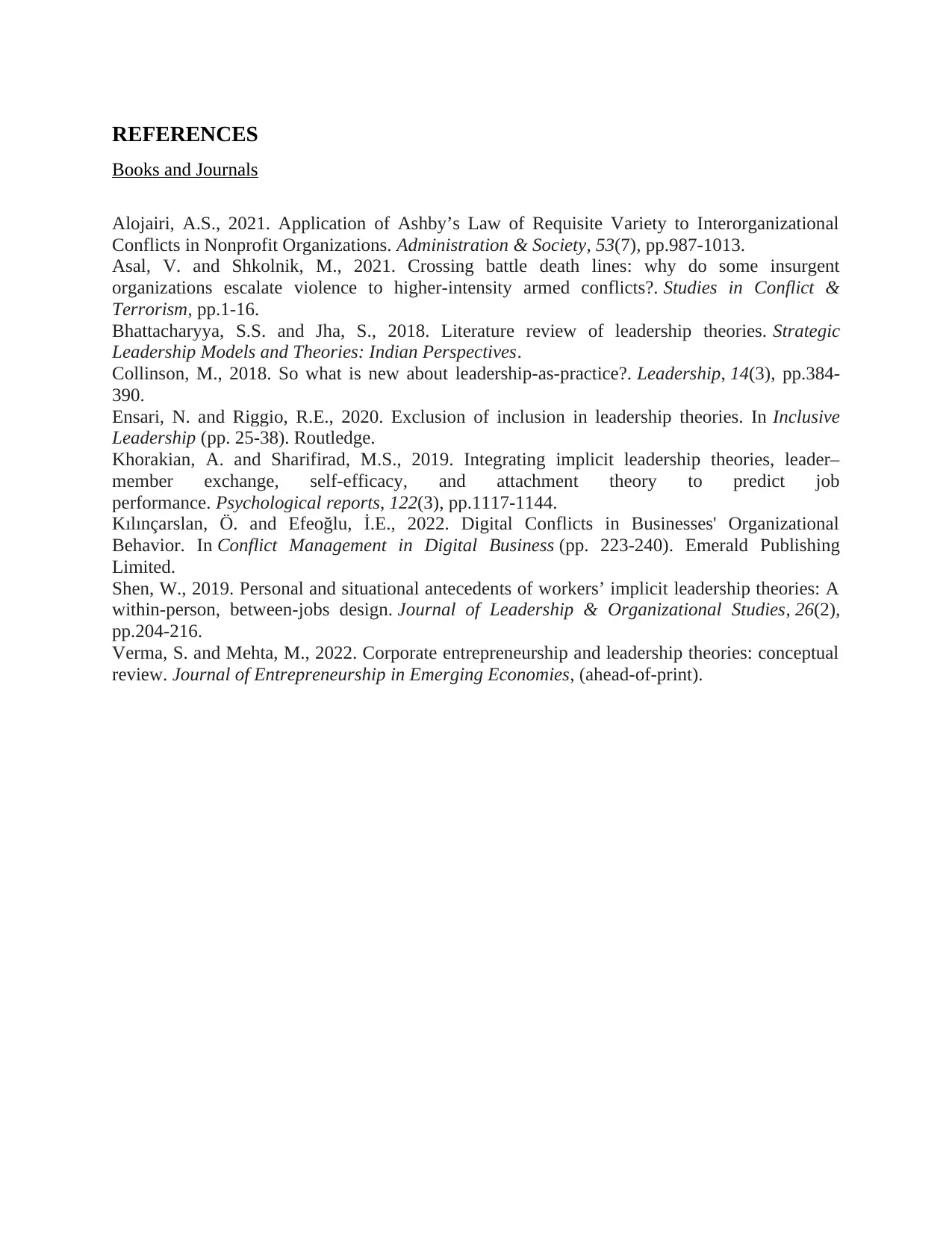
REFERENCES
Books and Journals
Alojairi, A.S., 2021. Application of Ashby’s Law of Requisite Variety to Interorganizational
Conflicts in Nonprofit Organizations. Administration & Society, 53(7), pp.987-1013.
Asal, V. and Shkolnik, M., 2021. Crossing battle death lines: why do some insurgent
organizations escalate violence to higher-intensity armed conflicts?. Studies in Conflict &
Terrorism, pp.1-16.
Bhattacharyya, S.S. and Jha, S., 2018. Literature review of leadership theories. Strategic
Leadership Models and Theories: Indian Perspectives.
Collinson, M., 2018. So what is new about leadership-as-practice?. Leadership, 14(3), pp.384-
390.
Ensari, N. and Riggio, R.E., 2020. Exclusion of inclusion in leadership theories. In Inclusive
Leadership (pp. 25-38). Routledge.
Khorakian, A. and Sharifirad, M.S., 2019. Integrating implicit leadership theories, leader–
member exchange, self-efficacy, and attachment theory to predict job
performance. Psychological reports, 122(3), pp.1117-1144.
Kılınçarslan, Ö. and Efeoğlu, İ.E., 2022. Digital Conflicts in Businesses' Organizational
Behavior. In Conflict Management in Digital Business (pp. 223-240). Emerald Publishing
Limited.
Shen, W., 2019. Personal and situational antecedents of workers’ implicit leadership theories: A
within-person, between-jobs design. Journal of Leadership & Organizational Studies, 26(2),
pp.204-216.
Verma, S. and Mehta, M., 2022. Corporate entrepreneurship and leadership theories: conceptual
review. Journal of Entrepreneurship in Emerging Economies, (ahead-of-print).
Books and Journals
Alojairi, A.S., 2021. Application of Ashby’s Law of Requisite Variety to Interorganizational
Conflicts in Nonprofit Organizations. Administration & Society, 53(7), pp.987-1013.
Asal, V. and Shkolnik, M., 2021. Crossing battle death lines: why do some insurgent
organizations escalate violence to higher-intensity armed conflicts?. Studies in Conflict &
Terrorism, pp.1-16.
Bhattacharyya, S.S. and Jha, S., 2018. Literature review of leadership theories. Strategic
Leadership Models and Theories: Indian Perspectives.
Collinson, M., 2018. So what is new about leadership-as-practice?. Leadership, 14(3), pp.384-
390.
Ensari, N. and Riggio, R.E., 2020. Exclusion of inclusion in leadership theories. In Inclusive
Leadership (pp. 25-38). Routledge.
Khorakian, A. and Sharifirad, M.S., 2019. Integrating implicit leadership theories, leader–
member exchange, self-efficacy, and attachment theory to predict job
performance. Psychological reports, 122(3), pp.1117-1144.
Kılınçarslan, Ö. and Efeoğlu, İ.E., 2022. Digital Conflicts in Businesses' Organizational
Behavior. In Conflict Management in Digital Business (pp. 223-240). Emerald Publishing
Limited.
Shen, W., 2019. Personal and situational antecedents of workers’ implicit leadership theories: A
within-person, between-jobs design. Journal of Leadership & Organizational Studies, 26(2),
pp.204-216.
Verma, S. and Mehta, M., 2022. Corporate entrepreneurship and leadership theories: conceptual
review. Journal of Entrepreneurship in Emerging Economies, (ahead-of-print).
1 out of 8
Related Documents
Your All-in-One AI-Powered Toolkit for Academic Success.
+13062052269
info@desklib.com
Available 24*7 on WhatsApp / Email
![[object Object]](/_next/static/media/star-bottom.7253800d.svg)
Unlock your academic potential
Copyright © 2020–2026 A2Z Services. All Rights Reserved. Developed and managed by ZUCOL.





